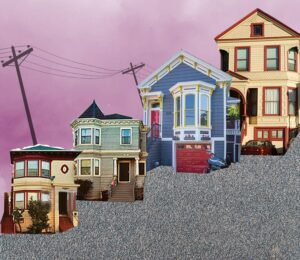
Growing up I had jet black and extremely curly hair, red lips, pink cheeks, super light skin, and as my family would say “the cutest little butt.” As I’ve gotten older, my hair has changed somewhat naturally, my cheeks are still noticeably rosy and I am still very light skinned. I’ve always been white passing and I strongly believe that it has had to do with how I identify.
My maternal grandpa is from Jalisco, Mexico. He had blonde hair, pale skin, and green eyes; so it’s no surprise I was born so light. In fact, as I was growing up, I didn’t realize I was so light. I knew that I was Mexican, and thought that everyone else knew too. Growing up, I would catch myself thinking, “I don’t look like my other Mexican friends.” Even my sister, grandma and tíos (my uncles) were darker than me; granted my tíos were tan from doing outside work on cars, on the house, or from going to el ramate (the flea market) every week.
When I came to Mills I learned about the term “white passing” and realized that is what I am. I learned about what that means in the context of history and what it means for people today. For example, when my grandparents were growing up, if you passed as white it meant you pretended to be so that you wouldn’t be discriminated against. Today, if you are white passing, you have more privileges than those who have more melanin. You aren’t judged by the way you look when you walk into a store or even followed by the shop owners or security guards. Instead, you are more likely to get help from someone because they think you are white rather than Mexican. You’re assumed to be better educated than someone who is darker, etc.
When some people see my last name or hear that I am from Southern California, they guess that I am Latina. For the most part though, I am usually not considered Latina, at least not immediately. While I was abroad in New Zealand last semester, I was talking to a shop owner and at one point, when he realized I was Latina, he laughed and told me, “I never would have known you were Mexican if you hadn’t said!” He saw no harm in that comment, but for me, it felt like a dagger.
I am proud to be Latina, proud of my heritage, my culture, my ancestors and my past. So when I am not affiliated with them, it hurts. Growing up, I internalized the feeling of not being Mexican enough, and I began to believe that I wasn’t really Latina.
My experience here at Mills has changed that feeling. I am learning that my white passing privilege doesn’t invalidate my cultural identity. I hope that others who have felt the same way- and sometimes still do- recognize that your skin tone does not represent your culture. You do.


